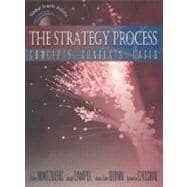
Note: Supplemental materials are not guaranteed with Rental or Used book purchases.
Purchase Benefits
What is included with this book?
Henry Mintzberg is Cleghorn Professor of Management Studies at McGill University in Montreal, Canada. His research has dealt with issues of general management and organizations, focusing on the nature of managerial work, forms of organizing, and the strategy formation process. Currently, he is completing a book about Developing Managers, not MBAs, and a pamphlet entitled Getting Past Smith and Marx . . . Towards a Balanced Society. He is also promoting the development of a family of masters programs for practicing managers. His own teaching activities focus on ad hoc seminars for managers and work with doctoral students.
He received his doctorate and master of science degrees from the M.LT. Sloan School of Management and his mechanical engineering degree from McGill, working in between in operational research for the Canadian National Railways. He has recently been named an Officer of the Order of Canada and of l'Ordre Nationale du Quebec and holds honorary degrees from thirteen universities. He also served as President of the Strategic Management Society from 1988 to 1991, and is an elected Fellow of the Royal Society of Canada (the first from a management faculty), the Academy of Management, and the International Academy of Management. He was named Distinguished Scholar for the year 2000 by the Academy of Management.
Joseph Lampel is Professor of Strategy at City University Business School, London. He received his doctorate in Strategic Management from McGill University in 1990, and was awarded Best Dissertation Award from the Administrative Science Association of Canada. Following his graduate studies Professor Lampel taught for seven years at the Stern School of Business, New York University. He subsequently moved to the United Kingdom where her held positions at University of St. Andrews and the University of Nottingham. Professor Lampel is the coauthor of The Strategy Safari with Henry Mintzberg and Bruce Ahalstrand. He has published extensively on strategy in management journals, and his articles have also appeared in the Financial Times and Fortune Magazine.
James Brian Quinn. Professor Quinn is a recognized authority in the fields of strategic planning, management of technological change, entrepreneurial innovation, and management of intellect and technology in the services sector. He has received both the Academy of Management's prestigious Outstanding Educator Award and its Book of the Year award (for Intelligent Enterprise).
Sumantra Ghoshal is Professor of Strategic and International Management at the London Business School. He also serves as the Founding Dean of the Indian School of Business in Hyderabad, of which LBS is a partner, and as a member of The Committee of Overseers of the Harvard Business School. Managing Across Borders: The Transnational Solution, a book he coauthored with Christopher Bartlett, has been listed in the Financial Times as one of the 50 most influential management books and has been translated into nine languages. The Differentiated Network: Organizing the Multinational Corporation for Value Creation, a book he coauthored with Nitin Nohria, won the George Terry Book Award in 1997. The Individualized Corporation, coauthored with Christopher Bartlett, won the Igor Ansoff Award in 1997, and has been translated into seven languages. His last book, Managing Radical Change, won the Management Book of the Year award in India. With doctoral degrees from both the MIT School of Management and the Harvard Business School, Sumantra serves on the editorial boards of several academic journals and has been nominated to the Fellowships at the Academy of Management, the Academy of International Business, and the World Economic Forum.
READINGS.
CASES.
The New copy of this book will include any supplemental materials advertised. Please check the title of the book to determine if it should include any access cards, study guides, lab manuals, CDs, etc.
The Used, Rental and eBook copies of this book are not guaranteed to include any supplemental materials. Typically, only the book itself is included. This is true even if the title states it includes any access cards, study guides, lab manuals, CDs, etc.